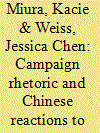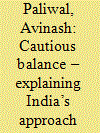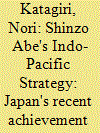|
|
|
Sort Order |
|
|
|
Items / Page
|
|
|
|
|
|
|
| Srl | Item |
| 1 |
ID:
173695


|
|
|
|
|
| Summary/Abstract |
Although China tends to be an important topic in election campaigns, the consequences of this rhetoric have not been systematically examined. We highlight the process by which China uses campaign rhetoric to make inferences about the intentions of new leaders in the US, Taiwan, and Japan. We identify two key criteria – consistency and change – that guide Chinese assessments. In turn, three patterns define Chinese policy toward new administrations: proactive engagement when campaign rhetoric is consistent with other indicators of policy change; reactive engagement when rhetoric is consistent with continuity; and a wait and see approach when rhetoric is inconsistent with the candidate’s past actions and the reputation of close advisors. Our findings push back against arguments linking leadership transitions to international conflict. Rather than testing the resolve of new leaders with military probes, foreign states can use information overheard during elections to gauge their counterparts’ intentions and ensure stability immediately after elections.
|
|
|
|
|
|
|
|
|
|
|
|
|
|
|
|
| 2 |
ID:
173698


|
|
|
|
|
| Summary/Abstract |
The US president Donald Trump pitched India’s participation as being central to his Afghanistan policy in 2017. Yet, as the US has sought a negotiated settlement with the Afghan Taliban, there is little clarity on how India seeks to deal with its increasing isolation in Afghanistan. This article focuses on India’s response toward the peace talks of 2015 and 2018/19 and investigates why its position changed. In 2015, New Delhi viewed Kabul’s outreach to Pakistan as a “tilt” harmful to India’s strategic interests; in 2018/19, India sought international support for Kabul to enter dialog without preconditions. The article argues that India seeks to ensure an ongoing strategic balance between Afghanistan and Pakistan. The source of such contrasting responses to the two peace talks, then, lies in India’s perception of and confidence in the US’ approach toward Afghanistan, and the changing landscape of Afghan domestic politics.
|
|
|
|
|
|
|
|
|
|
|
|
|
|
|
|
| 3 |
ID:
173697


|
|
|
|
|
| Summary/Abstract |
This article examines the alignment between Pakistan’s policies and U.S. security interests in six areas. While political rhetoric in the 2010s suggested that there was substantial divergence across all areas, the actual record was a mixed. There was considerable divergence on the war in Afghanistan and on India; manageable divergence on China; convergence with limitations on nuclear security; and convergence on the Middle East and on multinational soft security issues (peacekeeping and counterpiracy). Looking ahead, some cases could change from divergence to convergence or vice-versa, and the degree of convergence or divergence within each case may also change, though the overall mixed picture of convergence and divergence may persist. Washington may then adopt a tailored approach toward Islamabad. It could pursue a combination of pressure and engagement to reduce differences in the areas of divergence, while maintaining engagement to consolidate shared interests in the areas of convergence.
|
|
|
|
|
|
|
|
|
|
|
|
|
|
|
|
| 4 |
ID:
173696


|
|
|
|
|
| Summary/Abstract |
This article expands on the current research on nuclear terrorism by investigating how terrorist actors seek to capitalize on the nuclear weapons discourse in a country to gain domestic political influence. Existing research on nuclear terrorism has focused on operational aspects – attacks using nuclear materials and weapons, or attacks on nuclear facilities. This article focuses on the rhetorical use of nuclear weapons issues using the case of Pakistan, which has a substantial nuclear weapons complex, widespread domestic support for nuclear weapons, and numerous jihadist terrorist groups. It argues that some terrorist groups (Lashkar-e-Taiba, and the Pakistani Taliban) are increasingly participating in the nuclear discourse for political influence and to transform themselves as mainstream political actors. They portray themselves as the champions of Pakistan’s nuclear weapons against perceived threats from external actors, especially the United States, and aim to push Pakistani nuclear policy toward an Islamist and jihadist ideological framework.
|
|
|
|
|
|
|
|
|
|
|
|
|
|
|
|
| 5 |
ID:
173694


|
|
|
|
|
| Summary/Abstract |
I use IR theories to investigate Japanese foreign policy between 2012 and 2017. I make two arguments. First, I argue that the best theoretical combination to explain Japanese foreign policy under Abe is one of defensive realism and liberalism, with focus on the economic aspects of regional partnerships. Japan has followed a traditional realist approach in security policy, but he has adopted a more activist and broader economic vision in his approach. Second, this analysis reflects Japan’s expansive search of strategic allies in Southeast Asia and beyond; behind the security rivalry and economic partnership with China is the emergence of a geographically wider security architecture coupled with robust economic networks in Southeast Asia and South Asia. In effect, the Abe government has increased ties with India through trade and investment, and reinvigorated the existing diplomatic effort with Southeast and South Asia in a comprehensive package of security and economic initiative.
|
|
|
|
|
|
|
|
|
|
|
|
|
|
|
|
| 6 |
ID:
173692


|
|
|
|
|
| Summary/Abstract |
East Asian states infrequently seek peaceful dispute resolution through binding methods of international law. What is puzzling is why states seek one particular dispute resolution method or another, and in the specific case of the Philippines, why the government chose to pursue arbitration against China regarding the maritime boundaries of the disputed Spratly Islands, knowing that China would not agree to participate. In this article, we theorize that the Philippine government chose to pursue arbitration against China for three strategic reasons: 1) to counterbalance China’s military actions in the South China Sea, 2) because of the strong benefits to the state resulting from using arbitration, and 3) the probability of winning the case using arbitration was perceived by the Philippines as strong. To test our hypotheses, we use interviews and process tracing, through which we find evidence for our suppositions, primarily the last hypothesis.
|
|
|
|
|
|
|
|
|
|
|
|
|
|
|
|
| 7 |
ID:
173693


|
|
|
|
|
| Summary/Abstract |
This paper provides the first systematic analysis of China’s conduct in its offshore territorial conflict with Japan to contend that Beijing has adopted a wedging strategy aimed at weakening the U.S.-Japan alliance. Building on previous scholarship, the article demonstrates that over the post-Cold War era China has consistently subordinated its territorial interests in the Senkaku/Diaoyu dispute to help advance broader political and strategic goals. Drawing on Chinese writings, I argue that since 2010 Beijing has viewed U.S. and Japanese strategy in the conflict to be intended to contain it and that the empirical record suggests China’s conduct has, in turn, sought to counter this perceived threat by weakening the alliance at its core. Beijing, it is argued, has aimed to sow discord in the U.S.-Japan alliance by “making use of contradictions” perceived to afflict U.S. strategy.
|
|
|
|
|
|
|
|
|
|
|
|
|
|
|
|
|
|
|
|
|